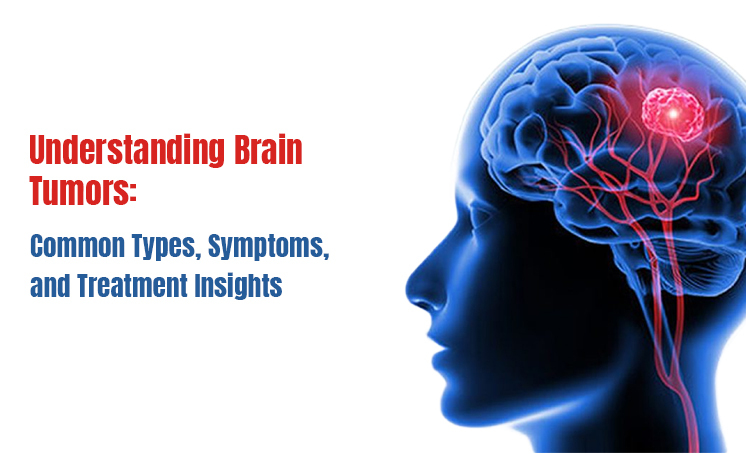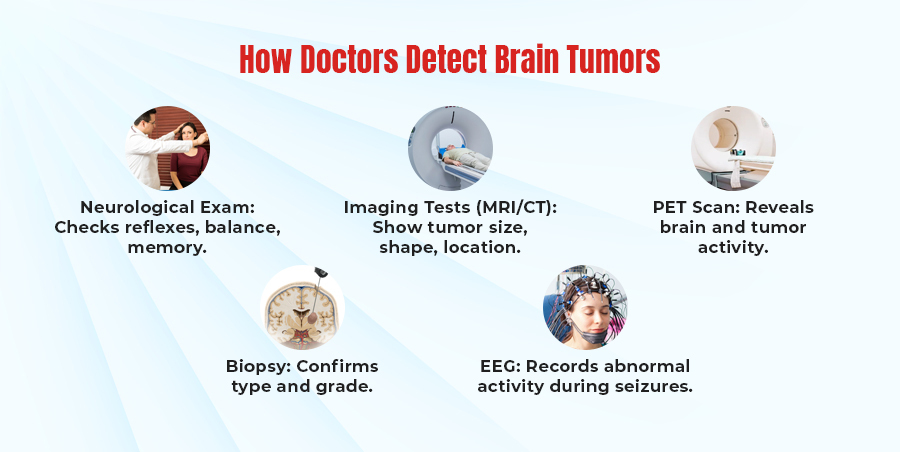Understanding Brain Tumors: Common Types, Symptoms, and Treatment Insights

Frequent headaches, sudden seizures, blurred vision, or changes in memory can leave you anxious and unsure of what’s happening inside your head. In some cases, these troubling signs may point to a brain tumor, an abnormal growth that can be either benign or malignant, slow-growing or highly aggressive.
Our team of highly experienced neurologists and neurosurgeons at PSRI Hospital, Delhi, recognized among the best for brain tumor treatment in India, specialize in identifying and managing these conditions with advanced imaging, precision surgery, and holistic care. Their goal is not just treatment, but improving quality of life.
In this guide, our experts will explain the most common brain tumor types, the warning symptoms you should not ignore, the diagnostic tests doctors rely on, and the treatment options available today.
Read on to understand how the right treatment can protect both brain health and overall quality of life.
Types of Brain Tumors
Brain tumors differ in how they grow, spread, and affect brain function. Some are slow-growing and benign, while others are aggressive and malignant. The most common brain tumor types include:
- Meningioma – A non-cancerous tumor in the brain’s protective layers. Grows slowly but may press on nearby tissue.
- Astrocytoma – A tumor starting in support cells of the brain. It can be mild or aggressive.
- Oligodendroglioma – Typically slow growing, but with a tendency to recur.
- Ependymoma – Grows in the fluid spaces of the brain and can block fluid flow.
- Glioblastoma (GBM) – The most aggressive and fastest-growing brain cancer, often difficult to treat.
- Medulloblastoma – Common in children, starting in the part of the brain that controls balance.
- Pituitary Tumors – Affect hormone levels, causing vision or growth-related changes.
- Acoustic Neuroma (Schwannoma) – A non-cancerous tumor on the nerve that controls hearing and balance.
Because each tumor behaves differently, our doctors rely on detailed scans and tests to decide the right treatment.
Brain Tumor Symptoms: What to Watch For
Brain tumor symptoms can vary depending on the tumor’s size, type, and location. Some signs are obvious, while others are subtle and easy to miss. Common symptoms include:

- Persistent headaches, often worse in the morning.
- Seizures, sometimes the first warning sign of certain tumors.
- Vision or hearing changes, such as blurred vision or ringing in the ears.
- Nausea and vomiting not linked to stomach illness.
- Balance problems and dizziness, especially if the tumor affects the part of the brain that controls coordination.
- Cognitive and personality changes, including memory loss, confusion, or mood swings.
- Weakness or numbness in arms or legs when movement areas are involved.
Note: Subtle symptoms like gradual personality changes or mild memory decline are often overlooked, making regular medical evaluation important when these signs appear.
Brain Tumor Treatment Options
Treatment for a brain tumor depends on its type, size, grade, location, and the patient’s overall health. The main treatment options include:
- Surgery – The first step for many tumors. In some cases, doctors use awake craniotomy so important brain functions are not harmed.
- Radiation Therapy – Uses strong beams to destroy leftover or hard-to-reach tumor cells. Stereotactic radiosurgery gives very focused, high-dose radiation.
- Chemotherapy – Special medicines to kill cancer cells. Often combined with radiation for aggressive tumors like glioblastoma.
- Tumor-Treating Fields (Optune) – A newer method that uses gentle electric fields to slow the growth of glioblastoma.
- Targeted & Immunotherapy – Advanced treatments that focus directly on cancer cells, with fewer side effects compared to standard therapy.
These brain tumor treatment options can sometimes remove the tumor completely, especially if it is benign or operable. In advanced cases, doctors may focus on palliative care, helping patients manage symptoms and maintain a better quality of life.
At PSRI Hospital, widely recognized as the best neuro hospital in India, patients receive advanced diagnostics, precise surgical care, and multidisciplinary support, ensuring both effective treatment and compassionate recovery.
Book Your Appointment with Experts at the Best Neuro Hospital in India
While general symptoms like headaches or dizziness can sometimes be managed with rest or medication, persistent or severe signs may point to something more serious such as a brain tumor. In such cases, timely medical attention is critical to protect both brain health and quality of life.
At PSRI, the best hospital in Delhi, our highly experienced neurologists and neurosurgeons combine advanced diagnostic imaging, precision surgery, and personalized care to deliver safe and effective brain tumor treatment. From early detection to long-term recovery support, we ensure every patient receives expert guidance at each step.
Located in South Delhi, PSRI Hospital is easily accessible for patients across Delhi NCR and beyond, making advanced neuro care available when it’s needed most.
Don’t ignore warning signs like seizures, vision changes, or unexplained headaches. Book a consultation with our neuro specialists today at +91 84 84 84 84 17 and take the first step towards safe, timely treatment.
FAQs
Q1. Can a brain tumor be cured completely?
Ans. Some brain tumors, especially benign or operable ones, can be removed completely with surgery. Malignant tumors may need combined treatments to control growth and improve survival.
Q2. Are brain tumors always cancerous?
Ans. No, not all brain tumors are cancerous. Many, like meningiomas and acoustic neuromas, are benign but can still cause symptoms if they press on brain tissue.
Q3. How fast do brain tumors grow?
Ans. Growth rate depends on the type. Benign tumors may grow very slowly over years, while aggressive tumors like glioblastoma can progress within weeks to months.
Q4. What is the life expectancy with a brain tumor?
Ans. It varies by type, size, grade, and treatment response. Some patients live many years after treatment, while aggressive forms like glioblastoma have a shorter survival time.
Q5. Can lifestyle or diet prevent brain tumors?
Ans. There’s no proven way to prevent brain tumors. However, maintaining a healthy lifestyle, avoiding radiation exposure, and managing overall health may reduce risk factors.

 Book An Appointment
Book An Appointment Virtual Consultation
Virtual Consultation





